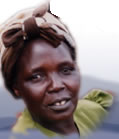THEMES IN THIS
TESTIMONY
Culture and Customs

Development

Family Life

Gender

Politics

Population

Social Change

Social Relationships

Click on arrows
to find more
testimonies
featuring
these themes
|
|
Sex
|
Male
|
|
|
Age
|
59
|
|
|
Identity
|
Sabaot
|
|
|
Occupation
|
local KANU Chairman
|
|
|
Location
|
Kopsiro
|
|
|
Date
|
November 1996
|
|
summary
The narrator is local chairman for the Kenyan African National Union, and the main interest in this interview comes from two areas: an analysis of the political situation in the area and its influence on development, and the contrast between the culture and traditions of the past and the present. Both topics are approached clearly and thoughtfully, and the narrator’s discussion of how the combination of “western influences”, the relatively recent introduction of a monetised economy, increasing poverty, decreasing land, and availability of education, have affected gender and social roles and relationships, is particularly interesting.
detailed breakdown
|
You will need a password from Panos to view the full
transcript of the interview. To apply for a password, click here.
Once you have a password, click here to go to the beginning
of the transcript. You can also click on any section of the
breakdown of content below and go straight to the
corresponding part of the transcript.
|
| Section 1 |
Educational and early employment history: narrator decided against going to college because he felt he was already a “responsible man” as he was circumcised, married and has a child.
|
| Section 2 |
Why he was prompted to stand for parliament: under-representation of the Mount Elgon people and under-development of the region. Stresses the role of elected leaders in development: “The leaders should be the agents of development. The leaders have been chosen by the people to represent them in various organs of government. They are meant to identify the people's problems and then seek for the best possible way to overcome them.”
|
| Section 2-4 |
Description of old circumcision rituals, and how they have changed. How the seclusion period was a time to teach the girls and boys about their future roles as adults: “The female would educate the female youth on how one could become a useful woman in the community and also how to take care of themselves as girls. Not to give themselves out to boys that is before they got married, and also the male would be taught on how to be brave enough to protect the family.” How hospital circumcision has ceased to be seen as taboo, and how less money is being spent on circumcision celebrations because of the need to pay school fees. How people take circumcision and all it entails less seriously nowadays.
Laments the social changes, brought about partly by education, in the community today: “But these days, things have changed. You even find some parents that have deviated from their responsibility, because when they see their children have learned more than themselves, they tend to respect the children and even address them as Mzee and yet these are just their children.”
|
| Section 5-6 |
Cattle rustling used to be the accepted way of proving oneself ready for marriage, and parents were the ones who decided on marriage partners: “...there was a lot of marriage by force in those days”. The old dowry system and how it has become too expensive these days partly due to outside influences: “The influence of western civilisation on our culture has eroded the cultural norms and taboos. For example, [in] the present economy, where children attend school, the parents expect a lot in terms of cash to compensate for the money they used to educate their girl children.” This has led to many “wrangles” and court battles between parents. Also due to increased travel, parents have less of a say of who marries whom.
|
| Section 6-7 |
Changes in what one looks for in a wife: old belief that “if the family was good, the girl would also be good” replaced by a desire for a well-educated partner. How roles of husband and wife were defined: “...the lady was the property of the husband and the community where she was married.” Believes that little has changed with regards to gender roles; women are still seen as “the property of their husband”, and in fact “wife inheritance” is still an “accepted” practice amongst the Sabaot, though it is declining because of poverty and women’s increased power.
|
| Section 8 |
Polygamy is decreasing because of land shortage and poverty, which has also led people to practise more family planning. Community attitudes to family planning and polygamy depend on education and political climate: during a time of conflict with the Bukusu, some political leaders encouraged the Sabaot to reproduce so as to “enlarge...[their] numbers”.
|
| Section 8-9 |
How initially the missionaries did not reach the Mount Elgon area.
Little involvement from the area’s people in the fight for independence. Post Independence politics.
|
| Section 10-12 |
Politics and development: how the latter has stagnated since 1979. How plans to build a health centre were sabotaged so the region received only a dispensary. Claims the Mount Elgon people remain loyal to KANU despite underdevelopment. The narrator attributes under-development to the disunity of the Mount Elgon people and to the lack of representation and communication with government.
Discussion of the resettlement of the people living in the forest.
|
| Section 12-13 |
The narrator continues airing his views on the causes of underdevelopment in Mount Elgon in the past, but admits that now “that we have our district, we are still not developing well.” The narrator attributes this to political differences and disunity, including the MP’s liking for doing things without consulting other leaders.
|
| Section 13-14 |
Discussion of the tribal clashes: sees them as the result of long standing differences exacerbated by multi-party politics. “...none of us benefited, neither the Bukusu nor the Sabaot. We all lost. We lost our lives, we lost property and some of our young men are still in custody as I am talking. And we also lost quite a lot on the side of education. The majority of the teachers were non-Sabaot. So during the clashes, all these people fled away and abandoned the schools.” |
|


